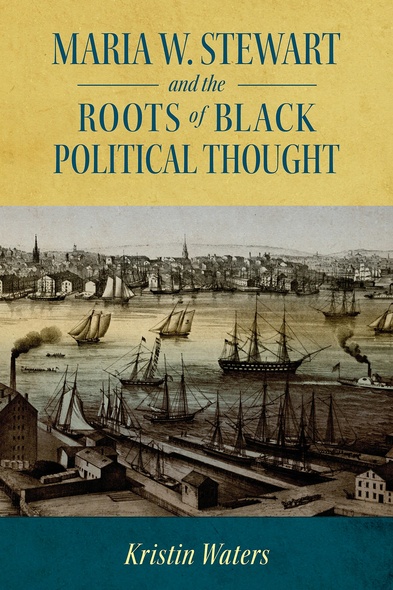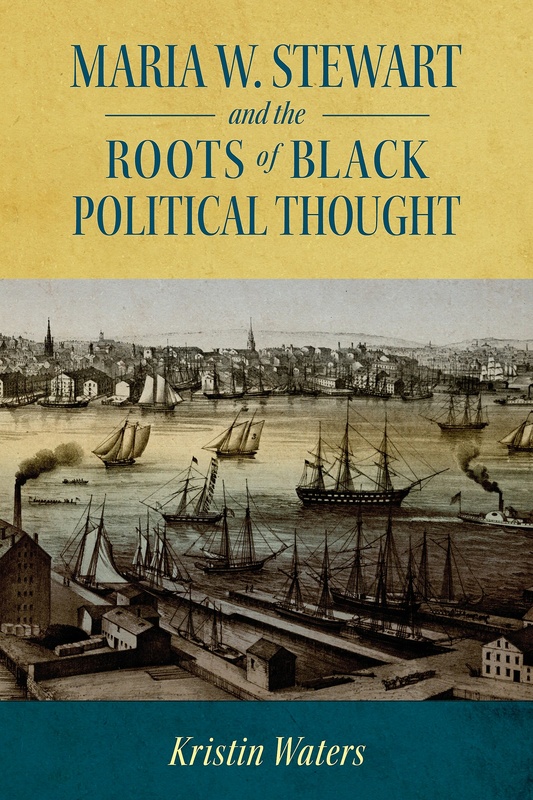Our shopping cart is currently down. To place an order, please contact our distributor, UTP Distribution, directly at utpbooks@utpress.utoronto.ca.

Maria W. Stewart and the Roots of Black Political Thought
Named a 2022 finalist for the Pauli Murray Book Prize in Black Intellectual History from the African American Intellectual History Society
Maria W. Stewart and the Roots of Black Political Thought tells a crucial, almost-forgotten story of African Americans of early nineteenth-century America. In 1833, Maria W. Stewart (1803–1879) told a gathering at the African Masonic Hall on Boston’s Beacon Hill: “African rights and liberty is a subject that ought to fire the breast of every free man of color in these United States.” She exhorted her audience to embrace the idea that the founding principles of the nation must extend to people of color. Otherwise, those truths are merely the hypocritical expression of an ungodly white power, a travesty of original democratic ideals. Like her mentor, David Walker, Stewart illustrated the practical inconsistencies of classical liberalism as enacted in the US and delivered a call to action for ending racism and addressing gender discrimination.
Between 1831 and 1833, Stewart’s intellectual productions, as she called them, ranged across topics from true emancipation for African Americans, the Black convention movement, the hypocrisy of white Christianity, Black liberation theology, and gender inequity. Along with Walker’s Appeal to the Coloured Citizens of the World, her body of work constitutes a significant foundation for a moral and political theory that is finding new resonance today—insurrectionist ethics.
In this work of recovery, author Kristin Waters examines the roots of Black political activism in the petition movement; Prince Hall and the creation of the first Black masonic lodges; the Black Baptist movement spearheaded by the brothers Thomas, Benjamin, and Nathaniel Paul; writings; sermons; and the practices of festival days, through the story of this remarkable but largely unheralded woman and pioneering public intellectual.
Waters’s method illuminates generative points of contact between Stewart’s personal life and political thought.
Waters offers both a groundbreaking and an archives-based study of Stewart that speaks to religious studies and historical scholarship. She expansively details the Black Boston that inspired and influenced Stewart beyond simply the realm of gender.
Kristin Waters has written a brilliant intellectual biography of the Black abolitionist feminist Maria Stewart. Not only has Waters recovered Stewart’s early life and adeptly placed her in the activist Black milieu in New England with fine historical research, but Waters has also adeptly examined her political philosophy through the lens of the long tradition of African American feminism. In Waters, Stewart has found a worthy biographer of her remarkable life and thought.
In Maria W. Stewart and the Roots of Black Political Thought, Kristin Waters tells the remarkable and inspiring story of one of the earliest Black women intellectuals to grace the national political stage. Drawing insights from the fields of philosophy and history, Waters masterfully explains how Maria W. Stewart fundamentally shaped—and was shaped by—the social and political worlds of Boston and beyond. Meticulously researched and powerfully argued, this book is mandatory reading for anyone interested in understanding the deep roots of Black feminist politics in the United States.
Maria Stewart is arguably among the most important American thinkers, abolitionists, and feminists who remains stubbornly unknown outside of scholarly circles. The way to change Stewart’s visibility is through the kind of detective work, scholarship, and full-length study that Waters here produces. It is high time for us to recognize the brilliance of those who survive oppression, who can take ‘the negative psychological repercussions of externally imposed racism’ and transform it ‘into a steely, enlightening (that is, knowledge producing) posture.’
Kristin Waters is professor emerita at Worcester State University and resident scholar at the Women’s Studies Research Center at Brandeis University. She is author of Women and Men Political Theorists: Enlightened Conversations and coeditor of Black Women’s Intellectual Traditions: Speaking Their Minds, which received the Letitia Woods Brown Award from the Association of Black Women Historians.




